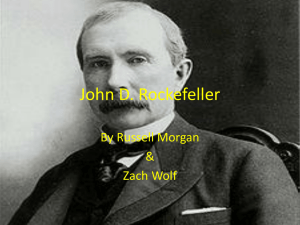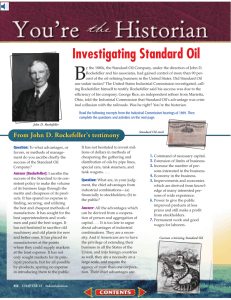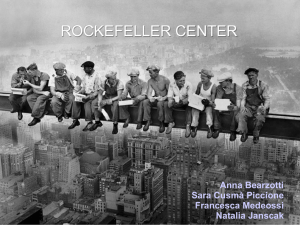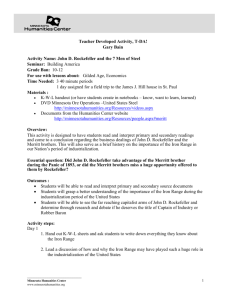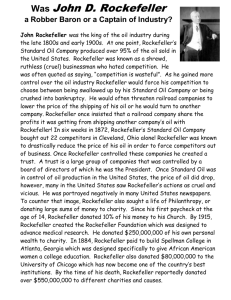3-Who was Rockefeller.indd
advertisement
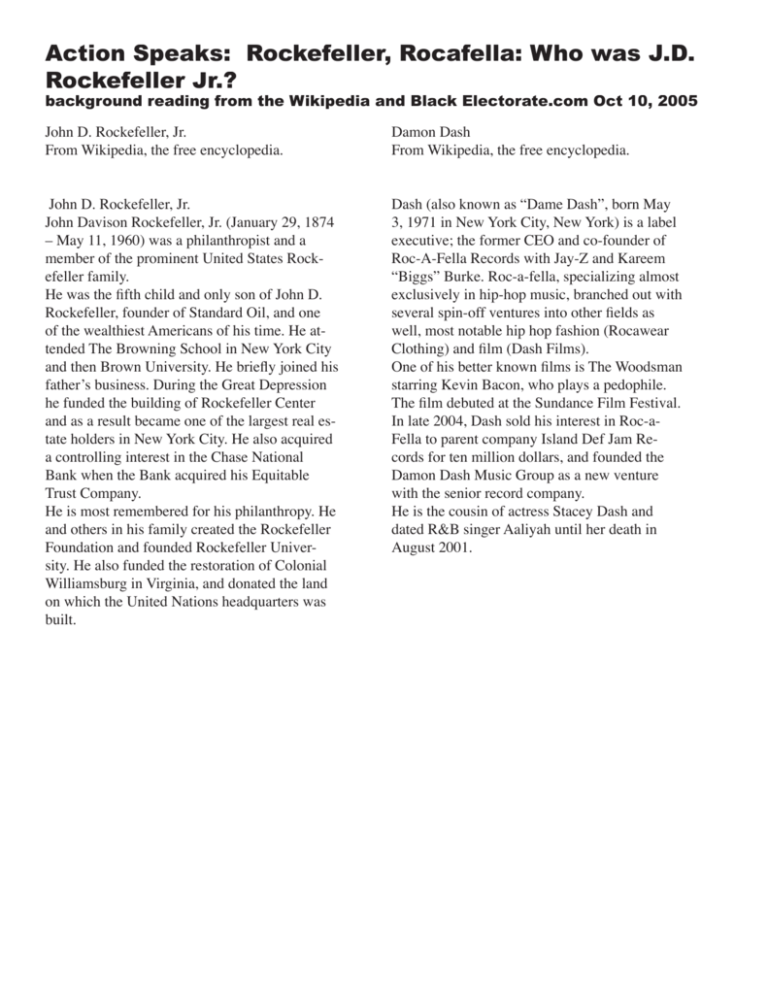
Action Speaks: Rockefeller, Rocafella: Who was J.D. Rockefeller Jr.? background reading from the Wikipedia and Black Electorate.com Oct 10, 2005 John D. Rockefeller, Jr. From Wikipedia, the free encyclopedia. Damon Dash From Wikipedia, the free encyclopedia. John D. Rockefeller, Jr. John Davison Rockefeller, Jr. (January 29, 1874 – May 11, 1960) was a philanthropist and a member of the prominent United States Rockefeller family. He was the fifth child and only son of John D. Rockefeller, founder of Standard Oil, and one of the wealthiest Americans of his time. He attended The Browning School in New York City and then Brown University. He briefly joined his fatherʼs business. During the Great Depression he funded the building of Rockefeller Center and as a result became one of the largest real estate holders in New York City. He also acquired a controlling interest in the Chase National Bank when the Bank acquired his Equitable Trust Company. He is most remembered for his philanthropy. He and others in his family created the Rockefeller Foundation and founded Rockefeller University. He also funded the restoration of Colonial Williamsburg in Virginia, and donated the land on which the United Nations headquarters was built. Dash (also known as “Dame Dash”, born May 3, 1971 in New York City, New York) is a label executive; the former CEO and co-founder of Roc-A-Fella Records with Jay-Z and Kareem “Biggs” Burke. Roc-a-fella, specializing almost exclusively in hip-hop music, branched out with several spin-off ventures into other fields as well, most notable hip hop fashion (Rocawear Clothing) and film (Dash Films). One of his better known films is The Woodsman starring Kevin Bacon, who plays a pedophile. The film debuted at the Sundance Film Festival. In late 2004, Dash sold his interest in Roc-aFella to parent company Island Def Jam Records for ten million dollars, and founded the Damon Dash Music Group as a new venture with the senior record company. He is the cousin of actress Stacey Dash and dated R&B singer Aaliyah until her death in August 2001. How did the Rockefeller family make its money? It all started with John D. Rockefeller (the father or J.D. Rockefeller Jr.) who left high school in 1855 to take a business course at Folsom Mercantile College. He completed the six month course in three months, and became an assistant bookkeeper. In 1858 he went into business. His firm, Clark & Rockefeller, invested in an oil refinery in 1863, and in 1865 Rockefeller sold out his share to his partner Clark. Next Rockefeller paid $72,500 for a larger share in another refinery, and formed the partnership of Rockefeller & Andrews. In 1870 Rockefeller, his brother, Flagler, Andrews, and a refiner named and three other men formed the Standard Oil Company, with John D. Rockefeller as president. Standard Oil gradually gained control of oil production in America. Its business methods, which brought immense wealth to the ownership and possibly lower prices for consumers, were widely and severely criticized. By 1901, Rockefeller was worth about $900 million and is believed to have been the worldʼs richest man at the time. His net worth when adjusted for inflation would put him in the top twenty modern-day billionaires; however, when adjusted for the size of the United States economy in his day, his net worth would dwarf that of any of todayʼs billionaires. In 2001, it was estimated that in contemporary money Rockefeller would be worth $200 billion. On May 15, 1911, the Supreme Court of the United States held that Standard Oil, which held 64% market share, was a monopoly and ordered it to be broken up, resulting in the creation of approximately 37 new companies. Rockefeller owned a piece of all of them. Most of todayʼs oil companies was born out of the Standard Oil Trust. Standard of California became Chevron. Standard of Ohio became Exxon. Standard of New york became Mobil and Continental oil became Conoco. Wikipedia, Oct 2005 How is Dame Dash making money today? The industry buzz ... following the controversial sale of the remaining 50% of Roc-A-Fella to Def Jam is that somehow Jay-Z, Dame and Biggs took a step backward or made only a lateral move. If the only standard is that another Blackfounded or significantly or majority Black-owned company has been sold to non-Blacks, then perhaps the case is open and shut, and the trio that Jay-Z styled as Hip-Hopʼs “rat pack” have cashed out. The debate then, is only whether or not they did so at fair market value, a premium, or at an unfortunate discount... Jay has stressed that his move, which involves not only his holding the top spot at Def Jam, but his obtaining ownership of his own masters... represents empowerment not just for himself but for all artists, who follow his path... While Dame in defending the decision has expressed his sole regret that the partners were not able to hold on to ownership of the Rocafella name. If I had all of the financial facts regarding the sale of the company and the related transactions and side “deals”, I would have liked to have performed my own valuation of Rocafella Records, and its brand name to determine how good or bad the deal was... At his press conference on Wednesday, Dame stated that Antonio “L.A.” Reid, Chairman, Island Def Jam Music Group is paying him and Biggs a substantial figure to serve as consultants to any Roc-A-Fella or Def Jam artist who desires to be consulted. So far, Joe Buddens and N.O.R.E. have sought their services and Beanie Sigel will continue to be advised by Dame (On another note, Dame emphasized that he will always be involved with Camʼronʼs career although the Harlem artist is no longer on Roc-A-Fella or Def Jam). And even if one knows the actual dollar figure of the sale of the company, do they know details of lucrative options, rights and aspects of the sale that have a greater future value than present, like the master recordings of Jay-Z? So, I think the sale of Roc-A-Fella has to be viewed from not only the standpoint of the actual facts of the agreement, but also from the lens of what Jay-Z and particularly Dame are able to do in post Roc-A-Fella endeavors. In a sense, Roc-A-Fellaʼs greatest value may be its legacy and the reputation it has created for Dame Dash as an entrepreneur and marketing genius. It is hard to argue that the success of Roc-A-Fella Records made Dame Dashʼs ownership of Rocawear, Armadale Vodka, Roc Digital, America Magazine, and Pro-Keds possible. It certainly made Dash/Dibella Promotions and the Dame Dash Music Group a reality. Cedric Muhammad Friday, January 28, 2005
